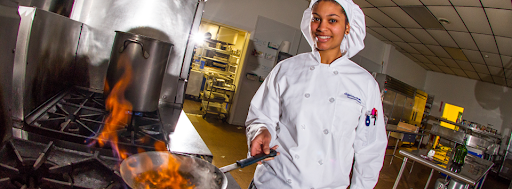What can I expect during the first few weeks at Wekiva Culinary?
The first few weeks of school are a period of orientation and settling-in. Students will not be actively cooking until they have had time to collect necessary supplies, while school guidance counselors are moving students between classes in order to meet requests and graduation requirements, and until students have successfully passed the annual food and personal safety training. During this time, students should acquire grease resistant, nonslip cooking shoes. While students MAY cook with close-toed shoes and will not be excluded for lacking nonslip cooking shoes, we highly recommend the extra level of safety.
NO STUDENT CAN BE IN THE TEACHING KITCHEN IF THEY ARE WEARING UNSAFE FOOTWEAR – FLIPFLOPS, SLIDES, OR SANDALS – EVER FOR ANY REASON. THIS IS A NONNEGOTIABLE DEPARTMENT OF HEALTH FOOD SAFETY ISSUE.

Why is there so much focus on the business side of cooking?
Culinary Arts and Hospitality Management is not the same thing as Home Economics – usually called by it’s old nickname: Home Ec.
We are NOT a cooking class.
In a traditional Home Ec class, students learn to cook for their families (as well as how to take care of home finances, laundry and clothing repair, infant and childcare, etc).

Culinary Arts and Hospitality, on the other hand, focuses on commercial cooking. In Culinary Arts, we learn the science of food, the way recipes are constructed and why they work, cost and menu management, and most importantly, how restaurants, catering companies, and resorts engage in volume cooking. We rarely make small meals. Instead, we focus on how businesses prepare food in three environments: restaurants, catering, and special events.
How often will I get to eat what I make?
Some students sign up for the Culinary Arts program because they believe they will get to eat everyday. This is not the case. All Culinary Arts students are encouraged to try everything they make and will frequently get to enjoy full meals – especially in Culinary 1. However, our philosophy is “Cook to Learn,” not “Cook to Eat.” The vast majority of what advanced students make is sold to staff members in our newly remodeled Mustang Cafe as a way of continuously funding the program.

If I really like Culinary, how do I get into culinary next year?
Due to the enormous popularity of our program and the unique learning, scholarship, and earning opportunities our students receive, it is impossible for ALL interested students to either enter the program or for ALL interested students to progress to the next course.
For this reason, all passionate students are encouraged to register as a magnet student during their Freshman year, to volunteer to help with catering events and fundraisers, to maintain a solid 3.0 GPA, to try-out for the competition team, and to study for certification exams. Magnet Students and Competition team members are given the right of first application.
